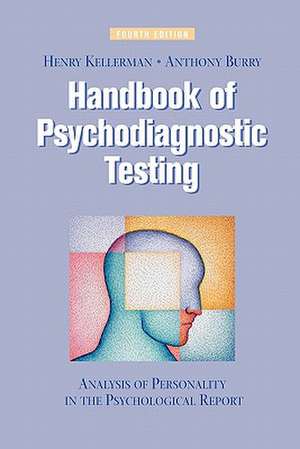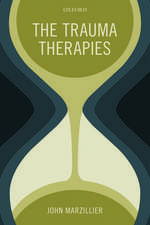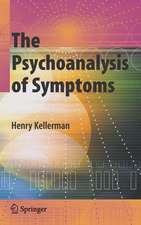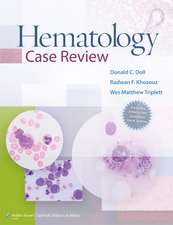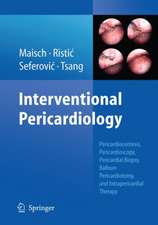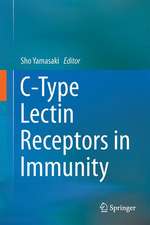Handbook of Psychodiagnostic Testing: Analysis of Personality in the Psychological Report
Autor Henry Kellerman, Anthony Burryen Limba Engleză Paperback – 28 oct 2010
This new edition covers emerging areas in borderline and narcissistic pathologies, psychological testing of preschool children, and bilingual populations. It also discusses the most current clinical issues and evaluating populations on which standard psychological tests have not been standardized.
| Toate formatele și edițiile | Preț | Express |
|---|---|---|
| Paperback (1) | 705.27 lei 6-8 săpt. | |
| Springer – 28 oct 2010 | 705.27 lei 6-8 săpt. | |
| Hardback (1) | 712.22 lei 6-8 săpt. | |
| Springer – 22 iul 2007 | 712.22 lei 6-8 săpt. |
Preț: 705.27 lei
Preț vechi: 742.39 lei
-5% Nou
Puncte Express: 1058
Preț estimativ în valută:
134.96€ • 141.19$ • 112.11£
134.96€ • 141.19$ • 112.11£
Carte tipărită la comandă
Livrare economică 02-16 aprilie
Preluare comenzi: 021 569.72.76
Specificații
ISBN-13: 9781441924377
ISBN-10: 144192437X
Pagini: 220
Ilustrații: XVIII, 202 p.
Dimensiuni: 155 x 235 x 15 mm
Greutate: 0.31 kg
Ediția:Softcover reprint of hardcover 4th ed. 2007
Editura: Springer
Colecția Springer
Locul publicării:New York, NY, United States
ISBN-10: 144192437X
Pagini: 220
Ilustrații: XVIII, 202 p.
Dimensiuni: 155 x 235 x 15 mm
Greutate: 0.31 kg
Ediția:Softcover reprint of hardcover 4th ed. 2007
Editura: Springer
Colecția Springer
Locul publicării:New York, NY, United States
Public țintă
Professional/practitionerDescriere
Since the debut of the original edition, the Handbook of Psychodiagnostic Testing has been an invaluable aid to students and professionals performing psychological assessments. The new Fourth Edition continues in that tradition, taking the reader from client referral to finished report, demonstrating how to synthesize details of personality and pathology into a document that is focused, coherent, and clinically meaningful.
As with the previous editions, authors Kellerman and Burry offer a systematic framework for choosing the most relevant material from seemingly overwhelming amounts of test data. Separate chapters offer clear rationales for each component of the report (e.g., cognitive functioning, interpersonal behavior, control mechanisms), and how they relate to one another. Helpful summaries follow each chapter, and tables and charts provide salient facts and findings at a glance.
Features of the updated Fourth Edition: A clear blueprint for writing effective, clinically integrative psychological reports; Emerging areas of interest in testing, including ethnic and language issues; Guidelines for assessing strengths and potential as well as pathology; Review of current diagnostic nomenclature, with discussion of evolving DSM categories and recognized clinical entities outside the DSM system; Brand-new sections on the major standardized intelligence tests; Expanded chapter devoted to testing counselors, teachers and parents; Help for writing–anxiety: overcoming blocks, getting past role conflicts, resisting speculation, and more.
The Handbook makes an elegant student resource by showing how reports can reflect not just the subject’s individuality, but the tester’s as well. All professionals who engage in psychological assessment will find it an invaluable resource as well.
As with the previous editions, authors Kellerman and Burry offer a systematic framework for choosing the most relevant material from seemingly overwhelming amounts of test data. Separate chapters offer clear rationales for each component of the report (e.g., cognitive functioning, interpersonal behavior, control mechanisms), and how they relate to one another. Helpful summaries follow each chapter, and tables and charts provide salient facts and findings at a glance.
Features of the updated Fourth Edition: A clear blueprint for writing effective, clinically integrative psychological reports; Emerging areas of interest in testing, including ethnic and language issues; Guidelines for assessing strengths and potential as well as pathology; Review of current diagnostic nomenclature, with discussion of evolving DSM categories and recognized clinical entities outside the DSM system; Brand-new sections on the major standardized intelligence tests; Expanded chapter devoted to testing counselors, teachers and parents; Help for writing–anxiety: overcoming blocks, getting past role conflicts, resisting speculation, and more.
The Handbook makes an elegant student resource by showing how reports can reflect not just the subject’s individuality, but the tester’s as well. All professionals who engage in psychological assessment will find it an invaluable resource as well.
Cuprins
The Referral.- Sections of the Psychodiagnostic Report.- The Clinical Interview.- Reality Testing and Cognitive Functioning.- Reality Testing and Cognitive Functioning.- Intellectual Functioning.- Intellectual Functioning.- The Nature of Anxiety.- Impulse Versus Control.- Impulse Versus Control.- Defensive Structure.- Interpersonal Behavior.- Interpersonal Behavior.- Diagnosis and Prognosis: Diagnostic Principles.- Diagnosis and Prognosis.- Intelligence Test Reports for Counselors, Teachers, and Parents, and Testing of Preschoolers.
Recenzii
From the reviews of the fourth edition:
"This discussion of the various elements involved in psychological assessments emphasizes the analysis of personality, especially anxiety. … Psychology students and professional psychologists are the intended audience. … This book is helpful for graduate psychology students and young professionals learning how to write good psychological reports, especially the personality section which always is the most difficult to formulate. It is appealing to those who embrace a psychodynamic or psychoanalytic theoretical persuasion." (Gary B. Kaniuk, Doody’s Reviews Service, August, 2008)
"This discussion of the various elements involved in psychological assessments emphasizes the analysis of personality, especially anxiety. … Psychology students and professional psychologists are the intended audience. … This book is helpful for graduate psychology students and young professionals learning how to write good psychological reports, especially the personality section which always is the most difficult to formulate. It is appealing to those who embrace a psychodynamic or psychoanalytic theoretical persuasion." (Gary B. Kaniuk, Doody’s Reviews Service, August, 2008)
Notă biografică
Henry Kellerman, Ph.D, Diplomate in clinical Psychology of the American Board of Professional Psychology, is training alalyst and senior supervisor at the Postgraduate Center for Mental Health in New York City. He is the author and editor of many books and numerous scientific papers and was the editor of the Columbia University Press book series Personality, Psychopathology, and Psychotherapy: Theoretical and Clinical Perspectives. A former National Institute of Mental Health Fellow, Dr. Kellerman is also a Fellow of th American Psychological Association and the American Group Psychotherapy Association. He has held faculty and staff positions at several hospitals and universities and maintains a private psychoanalytic practice in New York City.
Anthony Burry, Ph.D., clinical psychologist and psychoanalyst and Diplomate, American Board of Assessment Psychology, was formerly the Director of Psychology Internship Training, supervisor, and faculty memeber at the Postgraduate Center of Mental Health in New York City. Dr. Burry was also the Director of Psychological Evaluation at Comprehensive Psychological Services, and a Senior Supervisor of school mental health programs at the Brooklyn Center for Psychotherapy. He was Director of Psychology at Community Services for Human Development in New York City and was also a consultant in psychological assessment for seminary education for the Roman Catholic Diocese of Brooklyn. Dr. Burry has also held clinical positions involving psychotherapy and psychodiagnostic testing at St.Vincent's Guidance Institute in New York City and at the University of Kentucky Medical Center and the Veterans Administration Hospital in Lexington, Kentucky. Dr. Burry maintains a private practice in psychotherapy and Psychodiagnostic testing in New York City.
Anthony Burry, Ph.D., clinical psychologist and psychoanalyst and Diplomate, American Board of Assessment Psychology, was formerly the Director of Psychology Internship Training, supervisor, and faculty memeber at the Postgraduate Center of Mental Health in New York City. Dr. Burry was also the Director of Psychological Evaluation at Comprehensive Psychological Services, and a Senior Supervisor of school mental health programs at the Brooklyn Center for Psychotherapy. He was Director of Psychology at Community Services for Human Development in New York City and was also a consultant in psychological assessment for seminary education for the Roman Catholic Diocese of Brooklyn. Dr. Burry has also held clinical positions involving psychotherapy and psychodiagnostic testing at St.Vincent's Guidance Institute in New York City and at the University of Kentucky Medical Center and the Veterans Administration Hospital in Lexington, Kentucky. Dr. Burry maintains a private practice in psychotherapy and Psychodiagnostic testing in New York City.
Textul de pe ultima copertă
Since the debut of the original edition, the Handbook of Psychodiagnostic Testing has been an invaluable aid to students and professionals performing psychological assessments. The new Fourth Edition continues in that tradition, taking the reader from client referral to finished report, demonstrating how to synthesize details of personality and pathology into a document that is focused, coherent, and clinically meaningful.
As with the previous editions, authors Kellerman and Burry offer a systematic framework for choosing the most relevant material from seemingly overwhelming amounts of test data. Separate chapters offer clear rationales for each component of the report (e.g., cognitive functioning, interpersonal behavior, control mechanisms), and how they relate to one another. Helpful summaries follow each chapter, and tables and charts provide salient facts and findings at a glance.
Features of the updated Fourth Edition:
As with the previous editions, authors Kellerman and Burry offer a systematic framework for choosing the most relevant material from seemingly overwhelming amounts of test data. Separate chapters offer clear rationales for each component of the report (e.g., cognitive functioning, interpersonal behavior, control mechanisms), and how they relate to one another. Helpful summaries follow each chapter, and tables and charts provide salient facts and findings at a glance.
Features of the updated Fourth Edition:
- A clear blueprint for writing effective, clinically integrative psychological reports.
- Emerging areas of interest in testing, including ethnic and language issues.
- Guidelines for assessing strengths and potential as well as pathology.
- Review of current diagnostic nomenclature, with discussion of evolving DSM categories and recognized clinical entities outside the DSM system.
- Brand-new sections on the major standardized intelligence tests.
- Expanded chapter devoted to testing counselors, teachers and parents.
- Help for writing–anxiety: overcoming blocks, getting past role conflicts, resisting speculation, and more.
Caracteristici
Offers a central resource for the construction and organization of psychological reports
Helps both students and professionals write reports based on the particular needs and conflicts of the individual patient
Provides a model for constructing a psychodiagnostic report that integrates and synthesizes personality data derived from the standard projective battery
Covers emerging areas in borderline and narcissistic pathologies, psychological testing of preschool children, and bilingual populations
Summarizes the current diagnostic nomenclature
Discusses the most current clinical issues, including narcissistic and borderline phenomena, the unique problems of minority testing, evaluating populations on which standard psychological tests have not been standardized, and special consideration for bilingual patients
Helps both students and professionals write reports based on the particular needs and conflicts of the individual patient
Provides a model for constructing a psychodiagnostic report that integrates and synthesizes personality data derived from the standard projective battery
Covers emerging areas in borderline and narcissistic pathologies, psychological testing of preschool children, and bilingual populations
Summarizes the current diagnostic nomenclature
Discusses the most current clinical issues, including narcissistic and borderline phenomena, the unique problems of minority testing, evaluating populations on which standard psychological tests have not been standardized, and special consideration for bilingual patients
